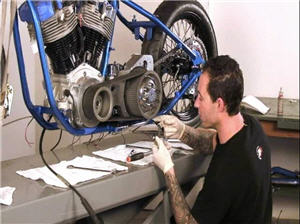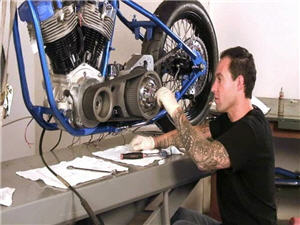Wet Clutch VS Dry Clutch!
Here we will discus a wet clutch versus a dry clutch for a motorcycle (as seen in the bike building video below).
Whether somebody is buying a new motorcycle or building their own from scratch, one consideration will be what kind of clutch the motorcycle should have.
The choice will be between a wet and a dry clutch, and there are advantages and disadvantages to each.
A wet clutch is soaked in a lubricating oil bath which keeps it cool and clean, whereas in a dry clutch the plates are allowed to operate without any lubricating oil.
It is said that the high performance oil used in a wet clutch will allow it to last for much longer than a dry clutch before needing to be replaced.
A wet clutch is therefore extremely durable.
The engine oil used in a motorcycle with a dry clutch is
much cheaper, however, as it does not have to be specially formulated to cool
and clean the clutch.
In addition, a dry clutch does not carry the added risk of extra leaks.
One of the main differences between motorcycles with wet and dry clutches is in the sound that they make.
Typically a wet clutch engine will be quiet, whilst a dry clutch engine will often make a rattling noise when the clutch is disengaged.
This is due to the fact that there is no oil to stop the clutch plates from striking each other. This noise is actually preferred by many people, who feel that is is a sign of a powerful and exciting motorcycle.
Motorcycle enthusiasts also love the look of the open belts which are found with dry clutch choppers. This is a very effective design which never fails to draw attention.
Care must be taken with this system, however, as primary belts are susceptible to breaking if the drive train isn't aligned properly.
Aside from how a motorcycle looks the most important consideration is obviously its performance. In terms of how easy a clutch is to control, a dry clutch is generally the lighter of the two. This is often preferable for new riders.
A motorcycle with a wet clutch, however, will often be prone to less problems due to the use of a compensating sprocket. This absorbs the shock when power is transferred between the engine and the transmission.
Wet primary clutches are, in general, much more reliable and longer lasting than dry clutches, and so they are often found on road bikes.
High performance motorcycles, however, will often have a dry clutch, which will be smaller and lighter in weight than the wet alternative. This can potentially give motorcycles with a dry clutch a speed advantage.
People who like dry clutches do so because they love the sound they make and the fact that with an open cover the clutch can be seen in operation. Wet, on the other hand, are preferable to many motorcycle owners because they are quiet and robust.
After considering the pros and cons of each it will always be a matter of personal preference which one is chosen.
Wet Primary Versus Dry Primary Clutch Summary.
Wet Primary Pros:
- Quiet
- Almost bullet proof.
- Have a compensating sprocket which dampens some of the jerking power transfer between the engine and transmission.
Cons:
- They are heavy
- Another place to possibly leak
Dry Clutch Primary Pros:
- Light
- Make a cool noise when the clutch is disengaged
- Open belts look cool
Cons:
Primary belts are succeptable to breaking if the drive train isn't aligned right.


